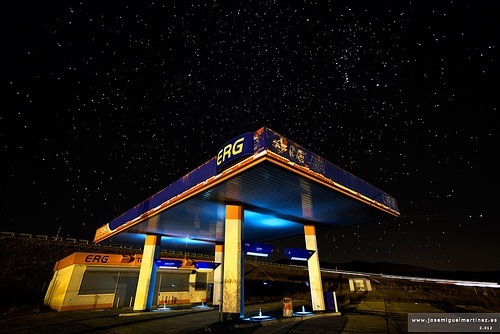Getting around - Lesson 2 - Conversation:
¿Hayuna gasolinera cerca de aquí?
(Isthere a gas station near here?)
(photoby
José Miguel usedunder terms of
Creative Commons license.)

|
Sargento Hudson: |
Perdone, agente, ¿hay una gasolinera cerca de aquí? |
Excuse me, officer. Is there
agas station near here? |
|
Agente: |
Sí, hay una en la Avenida de la Paz. |
Yes, there is one in |
|
Sargento Hudson: |
¿Y dónde está eso? |
And where is that? |
|
Agente: |
Mire. En el próximo semáforo, gire a la
derecha.Entonces, siga derecho hasta encontrar la gasolinera. Está en
unaesquina. |
Look. At the next trafficlight,
turn to the right. Then, continue straight ahead until you findthe gas
station. It is on a corner. |
|
Sargento Hudson: |
Muchas gracias. |
Thank you. |
|
|
En la gasolinera.
|
At the gas station. |
|
Empleado: |
¿Cuánta le pongo? |
How much do I put in? |
|
Sargento Hudson: |
Llene el depósito. Y póngame un litro de aceite. |
Fill the tank. And put in
aliter of oil for me. |
|
Empleado: |
Enseguida. |
Right away. |
|
Empleado: |
Listo. |
All done. |
|
Sargento Hudson: |
¿Qué le debo? |
What do I owe you? |
|
Empleado: |
Son mil quinientas pesetas. |
It is one thousand five hundred pesetas. |
|
Sargento Hudson: |
Aquí tiene. Quédese con la vuelta. |
Here you are. Keep the change. |
|
Empleado: |
Vale. Gracias. |
OK. Thank you. |
Notes on conversation
Agente.
Whentalking to a policeman or a trafficagent in
Quédese con lavuelta,"keep thechange."
Spanish gas stations only pump gas,they do not provide anyother services unless paid for. The attendant may put water in theradiator orair in the tires for you, but he will
expect a tip for the service. Spanishgas stations belong toa government monopoly, the CAMPSA.
Vale. "OK." Theword vale is used inSpanish very much like the expression "OK" is used in English. It maymean approval or agreement. As a question ¿vale?means
"Is it OK with you?" or "Do youagree?"